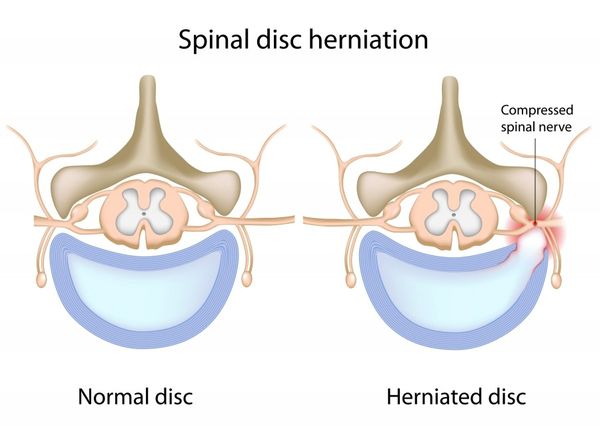Bulging Disc / Pinched Nerve
BULGING DISC/PINCHED NERVE TREATMENT IN BRICK TOWNSHIP, NJ
Helping People Relieve Their Pain Related To Their Spine and Return Them to a Higher Quality of Life

Bulging Disc and Pinched Nerve
Your spinal cord is a very important communication carrier that relays messages from your brain to your body and vice versa. As your spinal cord travels down your vertebrae, exiting nerves branch out to your muscles throughout the body. When one of these nerves becomes pinched either by herniated or bulging disc or bone spurs your body will send your warning signals such as pain or numbness. Never ignore these signals. The damage from a compressed or pinched nerve can be minor or major. If not treated may cause temporary or long-term problems. The sooner you see a spine specialist and get a proper diagnosis and treatment of the pinched nerve the quicker you can get pain relief. A pinched nerve that is not treated in some cases can cause irreversible damage such as loss of sensation and weakness in your muscles.
When a disc in the cervical spine ruptures, soft material from inside the disc can form a bulge that presses painfully against the spinal cord and nerve roots.
Causes of Pinched Nerves
Spinal and exiting nerves are most vulnerable in your spinal canal where they pass through narrow places called foramen. A pinched nerve is a direct compression or pressure on a nerve either from one of your disc, tendon or the surrounding bony structure in the foramen. Nerves become pinched because the spine becomes degenerated over time or because of trauma. Poor posture, heavy lifting and repetitive motion are just a few things that can cause spinal or disc degeneration.
Once a nerve becomes pinched an inflammatory process begins that may cause neck or low back pain. Sometimes this pain can radiate from your neck into your shoulder and arm (cervical radiculopathy) or down your leg commonly called sciatica. The disc between your vertebrae can become weak or cracked and develop tears. The Inner part of your disc called the nucleus pulpous can then push out through the outer part of the disc called the annulus and become a bulging or herniated disc that puts pressure on your spinal cord or exiting nerve.

Symptoms of Pinched Nerves
The most common symptom of a pinched nerve is a tingling sensation, which can be accompanied by some numbness. This may initially come and go, but over time becomes persistent. Pain may accompany the tingling sensation and is often described as being “sharp” or “electrical”. Some patients experience a burning or tightness sensation in the affected area.
In severe cases, muscle weakness may occur because the nerve that controls the muscle has been irritated. If present and not identified and corrected, those muscles may decrease in size and function. If nerve compression goes untreated for a long time the protective area around the nerve can breakdown and cause swelling, severe inflammation and scarring. This can lead to peripheral neuropathy, carpal tunnel syndrome (arms) and severe pain.

Treatment for Pinched Nerves
Rule of thumb conservative treatment such as rest, physical therapy, non-steroidal anti-inflammatory drugs (NSAIDs) and exercise are first choice for physicians. Rest and modification of activities can greatly benefit most patients. If the symptoms and pain last for more than 6 months and don’t get better with conservative treatment then more invasive and diagnostic measures are necessary. Each person is different how they heal and how long symptoms may last. Treatment also varies depending on the severity of the symptoms and the pinched nerve. When pain and symptoms last more than 6 months there are several options can be used such as:
- Oral corticosteroids – These are used to reduce swelling and pain.
- Narcotics – These are used for brief periods to reduce severe pain.
- Epidural Steroid injections – These injections may reduce swelling and allow inflamed nerves to recover.
- Surgery – The most common spine surgery used to decompress a pinched nerve is a microdiscectomy, laminectomy and the least invasive procedure called endoscopic discectomy.
The Jasper Spine Institute Interventional Pain Management Advantage:
- Less than ¼ inch incision
- Less post-operative pain and recovery than traditional minimally invasive procedures
- Outpatient procedure with patients discharged within 2 hours of surgery
- Return to work within 3-5 days*
At Jasper Spine Institute we listen and work with you to develop a unique treatment regime that addresses your pain and symptoms. Our goal is always to provide solutions whether conservative or surgical so that you are able to return to the quality of life you want without the pain and suffering.
* Always seek your physician’s opinion when it is safe to return to work. Also, light administrative duty is recommended until your physician approves of any physical demands at your place of work.
Contact Us Today
74 Brick Blvd. Brick, NJ 08723
Please take a moment to tell us a little about yourself and your needs. A member from Jasper Spine Institute will contact you as soon as possible. If your needs are urgent please contact us by phone at (732) 262-0700.
